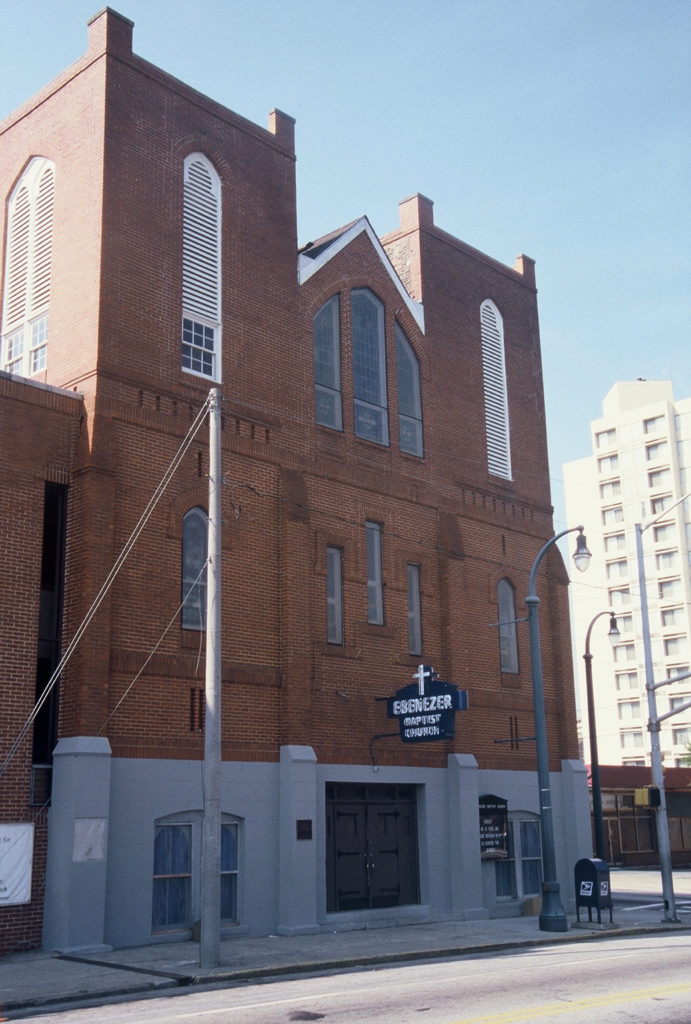When Campaign Attacks Become Theological
Deirdre Jonese Austin
Georgia State Capitol, Atlanta, Georgia. Source: DXR, Wikimedia CC BY-SA 4.0.
Currently, all eyes are on Georgia as the state prepares for the runoff elections on January 5th, which will determine which party has control of the Senate. While the battles between Jon Ossoff and David Perdue and Raphael G. Warnock and Kelly Loeffler are political, the battle between Warnock and Loeffler is proving to be theological as well. Rev. Dr. Raphael G. Warnock is not just another politician but also the senior pastor of Ebenezer Baptist Church – the Atlanta home church of the Rev. Dr. Martin Luther King Jr. Additionally, Rev. Dr. Warnock is a student of the late Dr. James Cone, often recognized as the founder of Black Theology, a liberation theology. In considering this broader context, the recent ads by Loeffler attacking Warnock’s campaign do not merely attack him as a politician but attack the Black prophetic tradition and Black theology, both of which interpret theology in a way that has social, economic, and political implications.
As it relates to Loeffler’s attacks that are theological as well as political, it is important to address a recent tweet and two recent campaign videos. On Twitter, Loeffler posted a video that shows Rev. Dr. Warnock speaking at an event that appears to be at Emory University’s Candler School of Theology. In the video, Rev. Dr. Warnock speaks of the need for the president and the nation to repent “for its worship of whiteness.” Loeffler’s caption for the video, however, depicts this rhetoric as being “disgusting and offensive,” expresses her belief that “we are ALL God’s children,” and describes Warnock’s speech as being “what division and fear looks like.”
Additionally, in her “Saving the Senate” campaign video, Loeffler describes Warnock as a radical, highlighting this quote: “Police power…a kind of gangster and thug mentality.” The ad accuses Warnock of hosting a rally for Fidel Castro while at the Abyssinian Baptist Church (he was serving as a youth pastor at the time of the 1995 event). Further, a Breitbart quote accuses him of “praising Marxism.”
Lastly, Loeffler’s “A Radical’s Radical” campaign video features a clip from Rev. Dr. Jeremiah A. Wright Jr.’s “God Damn America” sermon. It is followed by a statement as to Rev. Dr. Warnock defending him and giving him an award for truth telling. Furthermore, there is also a quote by Warnock calling Rev. Dr. Jeremiah A. Wright Jr. “a preacher and a prophet.” As a result, Warnock is accused of supporting an “anti-American hate speech.” Comments like these betray a misrepresentation and misunderstanding of both the Black prophetic tradition and Black theology.
The Black prophetic tradition is rooted in an understanding of the Biblical prophets of the Hebrew Bible and New Testament, including Jesus, and the Black experience in the United States. This biblical interpretation perceives prophets as being those who communicate a message from God addressing a current injustice. These prophets often call for those listening to repent of their sins and turn away from the injustices and idolatry they have been committing. In the New Testament, Jesus takes on a similar role. Jesus speaks as the Son of God and as one whose call entails service to the marginalized, especially the poor. This depiction becomes most evident in Luke’s portrayal of Jesus. Thus, the prophetic role of the Church is one that often centers the need to address injustices and to care for and serve marginalized communities.
While the prophetic tradition is not unique to the Black Church, the experiences of Black people within the United States have given rise to many historical and modern-day prophets. These are people who understand theology in relation to protest and revolution; people who are willing to speak truth to power, regardless of the circumstances or potential consequences; and people who are actively working towards freedom, liberation, and justice for those in the Black community. In the words of Cornel West, “The black prophetic tradition is simply one that says in the face of that catastrophe, we’ve got to analytically understand it, we’ve got to prophetically bear witness, and we’ve got to generate forms of fightback that organize and mobilize, beginning on the chocolate sides of town, but also embracing all freedom fighters of all colors.” The Black prophetic tradition entails a commitment to acknowledge and mobilize to address injustices. In his book Black Prophetic Fire, West highlights Frederick Douglass, W. E. B. DuBois, Martin Luther King Jr., Ella Baker, Malcolm C, and Ida B. Wells as those whose lives bear witness to the Black prophetic tradition.
A commitment to truth telling often requires that one challenge the systems of power and oppression in a way that can make people uncomfortable and defensive…
Situating Rev. Dr. Martin Luther King Jr. within the Black prophetic tradition is crucial to an understanding of Rev. Dr. Warnock as he serves at Ebenezer Baptist Church, a church intertwined with the life and legacy of Rev. Dr. Martin Luther King Jr. As such, Rev. Dr. Warnock often leans into the Black prophetic tradition in his sermons and ministry. Unafraid to address the systems and institutions that oppress and marginalize those within his largely Black Baptist church context, Rev. Dr. Warnock ministers through such occurrences as caravans to the polls and voter registration drives, trainings around human trafficking, protests and rallies, and even jail bailouts.

Similarly to Rev. Dr. Warnock, Rev. Dr. Jeremiah A. Wright Jr. represents one of the pastors who have come to be recognized within the Black prophetic tradition — which explains Warnock’s calling him “a preacher and a prophet” in Loeffler’s clip. Wright’s sermon, “Confusing God and Government” from which the “God Damn America” clip is drawn, exemplifies this tradition in that it highlights a need for the nation to repent, addresses the many injustices committed by the United States government, and highlights God as an unchanging God of justice. Rev. Dr. Warnock enacts similar work in the short clip Loeffler tweeted concerning his remarks on America’s need to repent “for its worship of whiteness.”
It is important to note that prophets, biblically and historically, have never been popular, with some even being killed for their beliefs — such as Jesus and the Rev. Dr. Martin Luther King Jr. A commitment to truth telling often requires that one challenge the systems of power and oppression in a way that can make people uncomfortable and defensive: few people desire to face the ways in which they are complicit in oppression, or to face the fact that freedom, liberation, and justice will require their giving up power.
An awareness of the history and reputation of the Abyssinian Baptist Church illuminates the actions of the church in 1995 in relation to the prophetic Black church tradition. Rev. Calvin Butts, the pastor at the time, is quoted as saying: “It is in our tradition to welcome all who are visionaries, revolutionaries and who seek the liberation of all people.” It is also worth noting that the Abyssinian Baptist Church reshapes the theology of Dietrich Bonhoeffer in relation to the Black prophetic tradition. Thus, the need to address injustices and a commitment to liberation demonstrates a commitment to the Black prophetic tradition but also Black theology.
The Black prophetic tradition often works alongside Black theology which has been associated with the late Dr. James Cone, of whom Rev. Dr. Warnock was a student. Like the Black prophetic tradition, Black theology is centered in liberation and poses the question of who Jesus is “to the oppressed Black person.” For Cone, God is on the side of the oppressed, and Jesus is “the Oppressed One” who identifies with the oppressed. Additionally, to be associated with the oppressed is to become Black. It is important to note that for Cone, theology is also political. In his book A Black Theology of Liberation, Cone writes, “Theology by contrast cannot be separated from the community which it represents,” going on to discuss Black theology as “the theological expression of a people deprived of social and political power.” In discussing Jesus, the political and social implications of Black theology are also present: “The appearance of Jesus as the black Christ also means that black revolution is God’s kingdom becoming a reality in America.” Thus, an understanding of God and Jesus in relation to the oppressed leads to a commitment to change the material circumstances of people. It represents a theology rooted in the needs of the body in addition to the soul, and one that requires works or deeds that develop out of one’s faith.
Thus, the need to address injustices and a commitment to liberation demonstrates a commitment to the Black prophetic tradition but also Black theology.
Ultimately, to truly understand the attacks against Rev. Dr. Warnock, one must situate him within the Black prophetic tradition and Black theology. His ministry and statements don’t contradict Loeffler’s statement that “We are ALL God’s children” but rather highlight the needs of those of God’s children who are oppressed, marginalized, and suffering. His work parallels the Movement for Black Lives in its emphasizing the ways Black people are disproportionately impacted by policing practices and many other policies. Out of his commitment to both the Black prophetic tradition and Black theology, Rev. Dr. Warnock calls out systems, institutions, and ideologies — such as the police, whiteness, and even the Trump administration — as sources of injustice and sometimes idolatry, and he calls people to repent of the ways they have worked to oppress and marginalize others. Furthermore, Rev. Dr. Warnock highlights a God who sides with the oppressed and a lynched Jesus who understands the suffering of those in the Black community and other oppressed communities nationally and globally. Rev. Dr. Warnock exemplifies a theology that developed within Black churches throughout history in the face of racism and white supremacy and expresses a need for a God and theology that leads to freedom, liberation, and justice. ♦

Deirdre “Jonese” Austin is a Master of Divinity student at Candler School of Theology. Her research interests include the Black Church and the intersections of religion, race, politics, and social justice, and you can learn more about her at DeirdreJoneseAustin.com.
Editors note: Jonese Austin serves as a ministerial intern at Ebenezer Baptist Church in Atlanta, GA, where Rev. Dr. Warnock serves as senior pastor. Canopy Forum does not endorse political candidates or causes, but aims to be a forum for scholarly discourse on issues at the intersection of law and religion.
Recommended Citation
Austin, Deirdre Jonese. “When Campaign Attacks Become Theological.” November 23, 2020. https://canopyforum.org/2020/11/23/when-campaign-attacks-become-theological/

